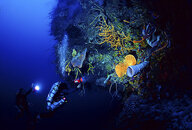ianr33
Contributor
Anybody know anything about the Sponge Belt in Cayman (Or anywhere else for that matter!) This is the zone between about 200 feet and 400 feet where there is not enough light for corals but instead large sponges predominate.
In particular I would be interested in how old these sponges are. The environmental conditions (light,temperature) must be pretty much constant and even the worst Hurricanes will not reach that deep.
My guess is that some of these sponges could be very,very,old ??
In particular I would be interested in how old these sponges are. The environmental conditions (light,temperature) must be pretty much constant and even the worst Hurricanes will not reach that deep.
My guess is that some of these sponges could be very,very,old ??




